We received the following announcement apparently from the Russian state today:
(more…)
Tags: asiatics, censorship, christian sodomy
We received the following announcement apparently from the Russian state today:
(more…)
Tags: asiatics, censorship, christian sodomy
Use this search blank to find metal on Amazon and pass along a small percentage to us!
Here are the essentials of a metal collection. Each one you buy sends us some small support.
Tags: Black Metal, death metal, Doom Metal, Grindcore, Heavy Metal, Speed Metal, Thrash
FOR IMMEDIATE RELEASE
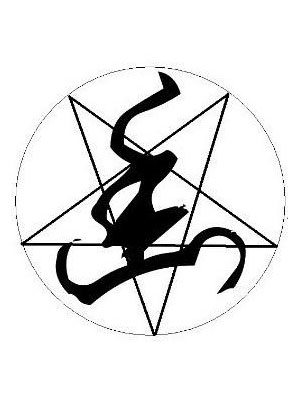 December 24, 2012 (Austin, TX) — The net’s oldest and longest-running metal site and home of the Heavy Metal FAQ, Death Metal Underground at deathmetal.org, announced today that the Inner Society blog at innersociety.org would be its exclusive representative in China.
December 24, 2012 (Austin, TX) — The net’s oldest and longest-running metal site and home of the Heavy Metal FAQ, Death Metal Underground at deathmetal.org, announced today that the Inner Society blog at innersociety.org would be its exclusive representative in China.
Inner Society has for some time provided album reviews, news, commentary and information about heavy metal with the outlook that heavy metal is an art form with significant contributions to make in its critique of modernity, and in its gesture of a more naturalistic way of life. It is the premiere blog in China for underground metal from this perspective.
“We are pleased to announce this collaboration, as it enables us to reach more people worldwide with the message of true metal,” said DeathMetal.org spokesperson Rob Jones. “The more people we reach, the more wimps and poseurs leave the hall, and the greater likelihood that the remainder start seeing metal as an art form, not a distraction or a product.”
The collaboration kicks off with an extensive interview with Inner Society progenitor and editor, Strider, which delves into the reasons behind the collaboration and the importance of heavy metal in the lives of people on all continents.
About DeathMetal.Org
Founded in 1988 and originally distributed over dial-up bulletin boards, the Death Metal Underground is an archive of information about metal that has changed over the years but stayed true to its focus: revealing heavy metal as the art form that it is, similar to the work of Romantic writers like E.A. Poe, H.P. Lovecraft, Mary Shelley, Samuel Taylor Coleridge, William Wordsworth and Bram Stoker.
About InnerSociety.org
The premiere blog in China for heavy metal theory, Inner Society has provided information about underground metal to audiences in China while keeping its focus on the development of the music worldwide. Lauded for its articulate, no-nonsense reviews, the site has attracted a loyal following during its years online.
1 CommentAres Kingdom – Incendiary
Avzhia – In My Domains
Divine Eve – Vengeful and Obstinate
Graveland – Cold Winter Blades
Immolation – Majesty and Decay
Inquisition – Ominous Doctrines of the Perpetual Mystical Macrocosm
Into Oblivion – Creation of a Monolith
Mutant Supremacy – Infinite Suffering
Profanatica – Disgusting Blasphemies Against God
Slaughter Strike – At Life’s End
Looking back on another fallen year, we might be reminded that the prior chapter of 2009 represented a global uprising of Death and Black Metal bands opposed to the phenomenon of underground Metal as a commodity as perpetuated by an impulsive, media-consumed, mass internet cult who denounce the culture of values which necessitated the very form of the music itself. This served to strengthen already riotous scenes of desecration and barbarity in extreme territories such as Australia and Canada, and forces across the United States and Europe began to mobilise with a renewed sense of dedication, guided by a selection of ancient voices who have not compromised their integrity to capture a new but deluded fanbase like their peers. The golden ages of Death and Black Metal have long since past and any campaigns to revive the spirit of Hessianism in Metal are not only in their infancy but vastly overshadowed by the populist trends that define the landscape of the genre today. As such, with the burden of anticipation on it’s shoulders, 2010 was by and large seized by veteran armies determined to distill the essence of their unholy craft from the impurities of our age, guiding further generations of warriors to victory. And though our imperious choices of 2010 are dominated by the hands of experience, a few young hordes also rose to the yawning of this battlefield to make bold and vigourous statements as the continuing legacy of true Metal’s eternal spirit.
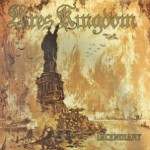 There is a certain door that any contemporary thrash band seeking quality must go through, a certain threshold that requires imagination and the indispensable talents of assimilation to really cross; in metal today, we see countless fragile trends that depend upon a rigid nostalgia and a lifeless worship of what has already happened, fully ignorant of the fact that what has true staying power is never something that was an idle imitation of something that was actually born of genius. In contrast to these bands, specifically the ones which belong to the so-called ‘retro-thrash’ trend, Ares Kingdom is of the opposite mindset; Ares Kingdom does not want to merely copy its primary influences, but to implement and authentically incorporate these influences into a relatively bold and forward-looking composition. The basic idea of Incendiary is quite simple: destroy the phoenix so that she may be reborn, an idea which is not so far from the opening narration of the Destroyer 666 track, Rise of the Predator. The execution, on the other hand, is what brings the band closer to actually demonstrating this vision than any other insignificant band that elects to portray death and apocalypse for aesthetic reasons alone; from the dismal album artwork to the indifference in Alex’s vocals, from the sad, painful melodies to the caustic and fiery riffs and solos that Chuck Keller (Order From Chaos) delivers, the listener can derive a sure sense of impending, even immediate doom. In conclusion, Ares Kingdom is not your average headbangin’, beer-swillin’, hell-worshipping thrash metal; ‘Incendiary’ offers us all the pace and vigour of the classic eighties bands, only it is properly assimilated and raised to a higher level through the cold visage of death metal and the individual imagination of the album’s creators. While sacrificing a bit of the rampant speed of the earlier recordings, ‘Incendiary’ compensates with a thoughtful development that is essential in allowing the band to convey its dark, apocalyptic vision; in other words, through the utility of a confident and dynamic mindset, Ares Kingdom has defiantly revealed a genuine idea independent of its forebears, and in so doing has crossed the threshold that has left so many inferior bands begging at the door.
There is a certain door that any contemporary thrash band seeking quality must go through, a certain threshold that requires imagination and the indispensable talents of assimilation to really cross; in metal today, we see countless fragile trends that depend upon a rigid nostalgia and a lifeless worship of what has already happened, fully ignorant of the fact that what has true staying power is never something that was an idle imitation of something that was actually born of genius. In contrast to these bands, specifically the ones which belong to the so-called ‘retro-thrash’ trend, Ares Kingdom is of the opposite mindset; Ares Kingdom does not want to merely copy its primary influences, but to implement and authentically incorporate these influences into a relatively bold and forward-looking composition. The basic idea of Incendiary is quite simple: destroy the phoenix so that she may be reborn, an idea which is not so far from the opening narration of the Destroyer 666 track, Rise of the Predator. The execution, on the other hand, is what brings the band closer to actually demonstrating this vision than any other insignificant band that elects to portray death and apocalypse for aesthetic reasons alone; from the dismal album artwork to the indifference in Alex’s vocals, from the sad, painful melodies to the caustic and fiery riffs and solos that Chuck Keller (Order From Chaos) delivers, the listener can derive a sure sense of impending, even immediate doom. In conclusion, Ares Kingdom is not your average headbangin’, beer-swillin’, hell-worshipping thrash metal; ‘Incendiary’ offers us all the pace and vigour of the classic eighties bands, only it is properly assimilated and raised to a higher level through the cold visage of death metal and the individual imagination of the album’s creators. While sacrificing a bit of the rampant speed of the earlier recordings, ‘Incendiary’ compensates with a thoughtful development that is essential in allowing the band to convey its dark, apocalyptic vision; in other words, through the utility of a confident and dynamic mindset, Ares Kingdom has defiantly revealed a genuine idea independent of its forebears, and in so doing has crossed the threshold that has left so many inferior bands begging at the door.
–Xavier
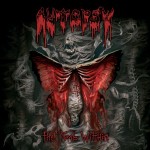 Of the artists who remain from times past, under whose names were unleashed the most disturbing and poignant sounds that defined Death Metal, Autopsy belong to a radical minority in rejecting the expectations of the contemporary audience and find their way back to the essence of their own sound on pure instinct alone. While the last couple of years has seen a rising of undead hordes practicing the ancient forms in a global campaign to transcend the pollutant mainstreamification of Death Metal, very few of these bands have really unlocked the primal secrets which were channelled into every classic of the old school – the dynamics of energy and the implementation within a brutal-violent, hysteric-emotional or transcendental-contemplative narrative, which the veteran likes of Asphyx, Autopsy and Goreaphobia have all recently demonstrated. The simple, largely hysteric level that The Tomb Within operates on makes it a powerful exercise of a seamless compositional style that is completely shaped by a savage state of consciousness, unintelligent yet impulsively aware of it’s own imminent death. Like an onrush of blood pumped through contracting arteries, guitars portray the frantic inner drama of one of Dr. Herbert West’s re-animations, diametrically opposed to his precise formulations regarding post-mortem. Atonal layering in the manner of Slayer’s more pathological works increases tension during these surging passages, punctuated by lead guitars that put to rest any hope of sanity returning. The trademark sludginess of Autopsy’s sound comes from instruments that are seemingly encased in adipocere, retaining within them all the character of their most memorable titles; not aspiring for a modern, clinical definition to their riffs but instead emphasising the rhythmic flow of energy in order to convey the sensations and suffocating experience of mortal dread. The band finds the balance once again of deathly force and doomy realisations as slower riffs offset the hysteria with tollings of morbid heaviness and an inescapable fate. Though Autopsy have stripped Death Metal to an essential skeletal frame, with the added simplicity of a horror movie-like thematic approach, this EP brings a much needed dimension of fear and madness to a world obsessed with ‘zombie horror’ as a populist, retro-hipster, marketing aesthetic.
Of the artists who remain from times past, under whose names were unleashed the most disturbing and poignant sounds that defined Death Metal, Autopsy belong to a radical minority in rejecting the expectations of the contemporary audience and find their way back to the essence of their own sound on pure instinct alone. While the last couple of years has seen a rising of undead hordes practicing the ancient forms in a global campaign to transcend the pollutant mainstreamification of Death Metal, very few of these bands have really unlocked the primal secrets which were channelled into every classic of the old school – the dynamics of energy and the implementation within a brutal-violent, hysteric-emotional or transcendental-contemplative narrative, which the veteran likes of Asphyx, Autopsy and Goreaphobia have all recently demonstrated. The simple, largely hysteric level that The Tomb Within operates on makes it a powerful exercise of a seamless compositional style that is completely shaped by a savage state of consciousness, unintelligent yet impulsively aware of it’s own imminent death. Like an onrush of blood pumped through contracting arteries, guitars portray the frantic inner drama of one of Dr. Herbert West’s re-animations, diametrically opposed to his precise formulations regarding post-mortem. Atonal layering in the manner of Slayer’s more pathological works increases tension during these surging passages, punctuated by lead guitars that put to rest any hope of sanity returning. The trademark sludginess of Autopsy’s sound comes from instruments that are seemingly encased in adipocere, retaining within them all the character of their most memorable titles; not aspiring for a modern, clinical definition to their riffs but instead emphasising the rhythmic flow of energy in order to convey the sensations and suffocating experience of mortal dread. The band finds the balance once again of deathly force and doomy realisations as slower riffs offset the hysteria with tollings of morbid heaviness and an inescapable fate. Though Autopsy have stripped Death Metal to an essential skeletal frame, with the added simplicity of a horror movie-like thematic approach, this EP brings a much needed dimension of fear and madness to a world obsessed with ‘zombie horror’ as a populist, retro-hipster, marketing aesthetic.
–ObscuraHessian
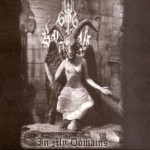 Another excellent tonal poem by this Mexican symphonic horde sees a sense of orchestration and riff balance that has all the consistency of ‘The Key Of Throne‘ from 2004, though takes a deeper foray into the realm of cinematic, ambient orchestration that recalls what Summoning have been getting at for the last 15 years, mixed with the battle hardened epics of Lord Wind. This new turn in a more heavily instrumental form recalls what fellow countrymen The Chasm brought about in the form of last year’s Farseeing The Paranormal Abysm with a little less emphasis on the central role of vocals. Though rather than the syncretic, melodic death metal of their peers, Avzhia’s black metal assault owes it’s periphery to the best works of Emperor, Graveland, Ancient, Summoning and Xibalba, throwing them into a cohesive and bombastic mould. I would not say that this tops their previous full length, but this follow up is very worthy indeed and consolidates their status as one of the great torch bearers of what black metal stood to express, the embodiment of restoring mystical imagination in the listener.
Another excellent tonal poem by this Mexican symphonic horde sees a sense of orchestration and riff balance that has all the consistency of ‘The Key Of Throne‘ from 2004, though takes a deeper foray into the realm of cinematic, ambient orchestration that recalls what Summoning have been getting at for the last 15 years, mixed with the battle hardened epics of Lord Wind. This new turn in a more heavily instrumental form recalls what fellow countrymen The Chasm brought about in the form of last year’s Farseeing The Paranormal Abysm with a little less emphasis on the central role of vocals. Though rather than the syncretic, melodic death metal of their peers, Avzhia’s black metal assault owes it’s periphery to the best works of Emperor, Graveland, Ancient, Summoning and Xibalba, throwing them into a cohesive and bombastic mould. I would not say that this tops their previous full length, but this follow up is very worthy indeed and consolidates their status as one of the great torch bearers of what black metal stood to express, the embodiment of restoring mystical imagination in the listener.
–Pearson
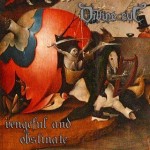
See review here.
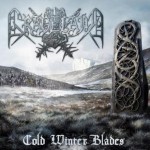 The unstoppable Rob Darken took again some time from swordfights and armour forging to take a look at the barbaric-modernist thematic system devised by composers such as Richard Wagner and Basil Poledouris, with a metallic energetic pulse rarely witnessed since Following the Voice of Blood; the last of the fast Graveland albums. The lack of Capricornus hardly matters because the authentic or perfectly synthesized drumkit recalls the same Celtic tribal warmarches and the raw, unsymmetric heartbeat of a primal man hunted by wolves, perfectly countered by the dark druid’s usual cold and hardened vocal delivery. A deeply neo-classical realization how to build heaviness through doomy speeds and chordal supplements still elevates the Polish seeker-initiator into a force far beyond today’s puny black and heathen metal “royalty”, looming beyond as a frightening presence of unrealized wisdom; nothing less than the Manowar of black metal, with no hint of irony or self-loathing. There exist two directions of expansion since the ethereal melodic chime of alfar nature in “From the Beginning of Time” is Summoning-esque (“Spear of Wotan” even features a variation of the “Marching Homewards” melody) while the harmonic perception takes a sudden dive into folkloric origins in the proto-rock riffing of “White Winged Hussary”, reminiscent of the most “redneckish” moments of the early albums. No essential component has been changed in a decade of work, but slight improvements of formula keep the mystically oriented listener spinning towards the distantly heard croaking ravens that herald the upcoming axe age, one that shall bless our corrupted world with a merciful blow from Wotan’s spear of un-death.
The unstoppable Rob Darken took again some time from swordfights and armour forging to take a look at the barbaric-modernist thematic system devised by composers such as Richard Wagner and Basil Poledouris, with a metallic energetic pulse rarely witnessed since Following the Voice of Blood; the last of the fast Graveland albums. The lack of Capricornus hardly matters because the authentic or perfectly synthesized drumkit recalls the same Celtic tribal warmarches and the raw, unsymmetric heartbeat of a primal man hunted by wolves, perfectly countered by the dark druid’s usual cold and hardened vocal delivery. A deeply neo-classical realization how to build heaviness through doomy speeds and chordal supplements still elevates the Polish seeker-initiator into a force far beyond today’s puny black and heathen metal “royalty”, looming beyond as a frightening presence of unrealized wisdom; nothing less than the Manowar of black metal, with no hint of irony or self-loathing. There exist two directions of expansion since the ethereal melodic chime of alfar nature in “From the Beginning of Time” is Summoning-esque (“Spear of Wotan” even features a variation of the “Marching Homewards” melody) while the harmonic perception takes a sudden dive into folkloric origins in the proto-rock riffing of “White Winged Hussary”, reminiscent of the most “redneckish” moments of the early albums. No essential component has been changed in a decade of work, but slight improvements of formula keep the mystically oriented listener spinning towards the distantly heard croaking ravens that herald the upcoming axe age, one that shall bless our corrupted world with a merciful blow from Wotan’s spear of un-death.
–Devamitra
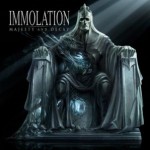
See review here.
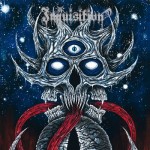 Recent history has borne witness to developments in Black Metal that sets the music more at war against itself than with it’s traditional enemies and time has accumulated vast quantities of debris resulting from this internal crisis of identity and credibility. The shape of all the rubble is appropriately rocky, resembling the multitude of “fairy land” daydreams based on genres of alternative popular music incorporated to gain the approval of outsiders who possess no more understanding of the wolfish, warlike and mystic poetry of Black Metal’s spiritual essence, but want to claim this ‘niche market’ as their own. Even the cloak of demonic symbology, long-since regarded as a joke to even the casual listener – little more than a generic garb for posturing and associating with the genre’s ancestors – has been accordingly stripped of all occultic luminance, which shined too fiercely over the eyes of the humanist infiltrator, such that the tears of depressive-suicidal ideologies would instantly evaporate. None of these signs of the times, however, have influenced the veteran duo of Dagon and Incubus, who, in an ultimate statement of Satanic zealotry and inhuman purity, tunnel back to the hypnotic primitivism of Black Metal’s first waves, re-formulating and refining the style of early Bathory to produce an album that reveals the inherent mystical wisdom which inspires Black Metal’s sinister imagery, with no recourse to obvious cliches nor over-intellectualisations in order to clutch at some idea of artistic credibility and potency. Based on the technique of Immortal’s ‘Pure Holocaust‘, Inquisition craft expansive yet blasting soundscapes from swirling portals of riffing immediately reminiscent of ‘The Return……‘ by Bathory in it’s Punkish brevity. These are inflected by dissonant open-chords and all manner of string-bending and sliding chaos to create a legitimate sense of increasing cosmic awareness and trans-dimensional ascension, as they circulate around each song’s central melody in a bizzarely motivic fashion. This is a component that bands such as Blut Aus Nord, who aspire to embellish their songs in such an experimental way, simply do not possess. Even the most meandering of arpeggiated open-chords don’t feel derivative as they sound out powerful and song-defining melodies rather than merely filling out time and space. Similarly to fellow Latin Americans Avzhia, Inquisition create a total sense of grandeur by bringing songs to an apex of expression through essentially simple but epic power-chord riffs. The masterful percussive transitions of Incubus guide the album fluidly between the various evolutionary elements of Inquisition’s sound, from the majestically crashing and pounding cadences of Burzum to the rolling avalanche of Immortal. Ominous Doctrines of the Perpetual Mystical Macrocosm is in many ways the album that the Blashyrkh horde should have recorded instead of ‘All Shall Fall’, as even Dagon’s toneless chanting style is somehow more expressive than past vocalisations in its similarity to Abbath. But all comparisons aside, there is no doubt as to which band reigns the Black Metal underground almost alone these days as Inquisition have created another uncompromising and profound work that no other so-called Satanists have the power to match.
Recent history has borne witness to developments in Black Metal that sets the music more at war against itself than with it’s traditional enemies and time has accumulated vast quantities of debris resulting from this internal crisis of identity and credibility. The shape of all the rubble is appropriately rocky, resembling the multitude of “fairy land” daydreams based on genres of alternative popular music incorporated to gain the approval of outsiders who possess no more understanding of the wolfish, warlike and mystic poetry of Black Metal’s spiritual essence, but want to claim this ‘niche market’ as their own. Even the cloak of demonic symbology, long-since regarded as a joke to even the casual listener – little more than a generic garb for posturing and associating with the genre’s ancestors – has been accordingly stripped of all occultic luminance, which shined too fiercely over the eyes of the humanist infiltrator, such that the tears of depressive-suicidal ideologies would instantly evaporate. None of these signs of the times, however, have influenced the veteran duo of Dagon and Incubus, who, in an ultimate statement of Satanic zealotry and inhuman purity, tunnel back to the hypnotic primitivism of Black Metal’s first waves, re-formulating and refining the style of early Bathory to produce an album that reveals the inherent mystical wisdom which inspires Black Metal’s sinister imagery, with no recourse to obvious cliches nor over-intellectualisations in order to clutch at some idea of artistic credibility and potency. Based on the technique of Immortal’s ‘Pure Holocaust‘, Inquisition craft expansive yet blasting soundscapes from swirling portals of riffing immediately reminiscent of ‘The Return……‘ by Bathory in it’s Punkish brevity. These are inflected by dissonant open-chords and all manner of string-bending and sliding chaos to create a legitimate sense of increasing cosmic awareness and trans-dimensional ascension, as they circulate around each song’s central melody in a bizzarely motivic fashion. This is a component that bands such as Blut Aus Nord, who aspire to embellish their songs in such an experimental way, simply do not possess. Even the most meandering of arpeggiated open-chords don’t feel derivative as they sound out powerful and song-defining melodies rather than merely filling out time and space. Similarly to fellow Latin Americans Avzhia, Inquisition create a total sense of grandeur by bringing songs to an apex of expression through essentially simple but epic power-chord riffs. The masterful percussive transitions of Incubus guide the album fluidly between the various evolutionary elements of Inquisition’s sound, from the majestically crashing and pounding cadences of Burzum to the rolling avalanche of Immortal. Ominous Doctrines of the Perpetual Mystical Macrocosm is in many ways the album that the Blashyrkh horde should have recorded instead of ‘All Shall Fall’, as even Dagon’s toneless chanting style is somehow more expressive than past vocalisations in its similarity to Abbath. But all comparisons aside, there is no doubt as to which band reigns the Black Metal underground almost alone these days as Inquisition have created another uncompromising and profound work that no other so-called Satanists have the power to match.
–ObscuraHessian
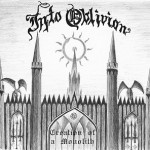
See review here.
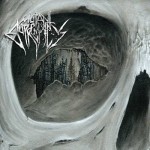 The New York City borough of Brooklyn might be better known to the universal consciousness as “The Hipster Capital of the World”, “A Fantastic Place to Collect STDs”, or “Where Culture Goes to be Sodomized”, amongst other colorful and imaginative epithets. Naturally, any self-touting Metal bands originating from this region ought to be approached with utmost scrutiny, as these are all almost invariably revealed to be alternative rock acts hiding beneath a masquerade of long hair and Dionysian discord. Breaking decisively away from this brand of perfidious whoredom are nouveau death metallers Mutant Supremacy, who occupy a peculiar nexus in between Monstrosity, Dismember, and Infester — thus setting them apart from the archetypal NYDM style as well. Seemingly fueled by an intense hatred for the free-loving cosmopolitanism that surrounds them, this band constructs theatrically explosive war-anthems conceptualized around a post-nuclear-apocalyptic Hell on Earth, rife with Thrasymachan rhetoric, biological abominations, and grisly accounts of human extermination. Songwriting on this debut mostly shows a clean-cut and sharp sense of narration clearly indicative of a studied discipline in the arts of classic Slayer, although there are a few odd weak moments where stylistic confusion vomits forth a spate of old school clichés and uncompelling Flori-death/Swe-death/British Grindcore aggregates. Overall, however, there is certainly something refreshingly violent in development here, and it’s a victory to hear such a proud death knell coming from what is otherwise an utterly syphilis-addled portion of the planet.
The New York City borough of Brooklyn might be better known to the universal consciousness as “The Hipster Capital of the World”, “A Fantastic Place to Collect STDs”, or “Where Culture Goes to be Sodomized”, amongst other colorful and imaginative epithets. Naturally, any self-touting Metal bands originating from this region ought to be approached with utmost scrutiny, as these are all almost invariably revealed to be alternative rock acts hiding beneath a masquerade of long hair and Dionysian discord. Breaking decisively away from this brand of perfidious whoredom are nouveau death metallers Mutant Supremacy, who occupy a peculiar nexus in between Monstrosity, Dismember, and Infester — thus setting them apart from the archetypal NYDM style as well. Seemingly fueled by an intense hatred for the free-loving cosmopolitanism that surrounds them, this band constructs theatrically explosive war-anthems conceptualized around a post-nuclear-apocalyptic Hell on Earth, rife with Thrasymachan rhetoric, biological abominations, and grisly accounts of human extermination. Songwriting on this debut mostly shows a clean-cut and sharp sense of narration clearly indicative of a studied discipline in the arts of classic Slayer, although there are a few odd weak moments where stylistic confusion vomits forth a spate of old school clichés and uncompelling Flori-death/Swe-death/British Grindcore aggregates. Overall, however, there is certainly something refreshingly violent in development here, and it’s a victory to hear such a proud death knell coming from what is otherwise an utterly syphilis-addled portion of the planet.
–Thanatotron
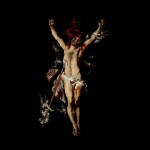 True to form, Profanatica release a focused, energetic and iconoclastic opus that shatters and mocks any infantile and moralistic conception of reality. Both compositionally and aesthetically powerful, the production on Disgusting Blasphemies against God is both clear and full, lending itself nicely to an analysis of its subtleties and providing the clarity necessary to gain a chuckle at the expense of nearby spectators privy to the album’s intrusive vitriol. Ledney’s vocals are hilariously clear yet retain a threateningly violent quality that is becoming of this style of Black Metal. As Ledney vomits forth his blasphemic ritual, listeners are treated to a notably ominous musical atmosphere that is uncomfortably somber, deranged and challenging. Utilizing single note tremolo picking, reminiscent of a cross between a more consonant Havohej and the effective and simple melodies of VON, Ledney in is his genius, develops motifs, that while perhaps more obvious and accessible, remain potent and successfully create an intriguing state of anxiety. These motifs both seamlessly emerge from, and return to sinister Incantation style riffs which work together to develop a unity and structural coherence that while primal and simple is undoubtedly effective. The interplay between these musical variable creates an overall experience that portends the celebration of the powerful, living and animated chthonic mysteries and perhaps more pressingly the apotheosis of their necessary destructive capacities.
True to form, Profanatica release a focused, energetic and iconoclastic opus that shatters and mocks any infantile and moralistic conception of reality. Both compositionally and aesthetically powerful, the production on Disgusting Blasphemies against God is both clear and full, lending itself nicely to an analysis of its subtleties and providing the clarity necessary to gain a chuckle at the expense of nearby spectators privy to the album’s intrusive vitriol. Ledney’s vocals are hilariously clear yet retain a threateningly violent quality that is becoming of this style of Black Metal. As Ledney vomits forth his blasphemic ritual, listeners are treated to a notably ominous musical atmosphere that is uncomfortably somber, deranged and challenging. Utilizing single note tremolo picking, reminiscent of a cross between a more consonant Havohej and the effective and simple melodies of VON, Ledney in is his genius, develops motifs, that while perhaps more obvious and accessible, remain potent and successfully create an intriguing state of anxiety. These motifs both seamlessly emerge from, and return to sinister Incantation style riffs which work together to develop a unity and structural coherence that while primal and simple is undoubtedly effective. The interplay between these musical variable creates an overall experience that portends the celebration of the powerful, living and animated chthonic mysteries and perhaps more pressingly the apotheosis of their necessary destructive capacities.
–TheWaters
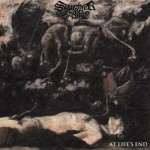 Toronto’s death dealers unearth the forgotten formulas of 80s-90s extreme metal in their second offering, a follow-up to the debut cassette “A Litany of Vileness”. This punk-driven death metal statement delivered by veterans of Canadian scene (former members of The Endless Blockade and Rammer) shows no mercy: it is short, volatile and dirty. Yet, at the same time the material is well weighed and balanced, blessed with the genuine feel of old-school art. The production helps conveying old metal nostalgia whereas Spartan songwriting confronts useless acrobatic tendencies of the modern scene. The band’s uncompromising music is perfectly collaborated with artwork by Moscow artist Denis Kostromitin. Standing on the shoulders of giants like Autopsy, Carnage, Pestilence, Repulsion and Discharge these reapers managed to find a voice of their own. We can only hope that this beautifully presented vinyl-only release is a “carnal promise” of Slaughter Strike’s prospects.
Toronto’s death dealers unearth the forgotten formulas of 80s-90s extreme metal in their second offering, a follow-up to the debut cassette “A Litany of Vileness”. This punk-driven death metal statement delivered by veterans of Canadian scene (former members of The Endless Blockade and Rammer) shows no mercy: it is short, volatile and dirty. Yet, at the same time the material is well weighed and balanced, blessed with the genuine feel of old-school art. The production helps conveying old metal nostalgia whereas Spartan songwriting confronts useless acrobatic tendencies of the modern scene. The band’s uncompromising music is perfectly collaborated with artwork by Moscow artist Denis Kostromitin. Standing on the shoulders of giants like Autopsy, Carnage, Pestilence, Repulsion and Discharge these reapers managed to find a voice of their own. We can only hope that this beautifully presented vinyl-only release is a “carnal promise” of Slaughter Strike’s prospects.
–The Eye in the Smoke
1 Comment
Tags: 2010, Australian Death Metal, best of, Black Metal, Canadian Black Metal, Canadian Death Metal, Columbian Black Metal, Florida Death Metal, Mexican Black Metal, New York Death Metal, Pagan Metal, Polish Black Metal, Texan Death Metal, To do: update DM review links, USBM, zine-reviews
Cherry MX Board 1.0 red switch wired mechanical keyboard
$50
Many of you play games, and many others are simply nerds, so you probably have interest in mechanical keyboards. The problem you face arises from most of the buying audience being hipsters who gravitate toward $300 feature-laden keyboards that offer no additional function.
No CommentsTags: gaming, mechanical keyboard, nerd shit
I wish I could report a greater success here, since this beer is from our Scots-Irish neighbors to the North in Dallas, but this beer takes an IPA and moves it closer to an American adjunct beer. Heavy overtones of citrus, squash, and boiled grain afflict what is otherwise a solid IPA.
34 CommentsTags: beer, hipster beer, IPA, manhattan project brewing company
No one doubts that hipsters must die, but first we should thank them for bestowing upon us the resurgence of India Pale Ales. These get beer past the soft drink phase by reducing sweetness and instead dialing up the slightly spicy hops bitterness for a cleanly refreshing beer.
26 CommentsTags: beer, IPA, paradigm brewing company
The first track here must be the first song the band ever composed, because it’s a bad indicator of what the bulk of material on this demo has in store for the listener. After a brief foray into a low-tech take on early Morbid Angel, Lord of Plague then launch into two pieces that bring to mind the churning music of Floridian acts such as Monstrosity, Malevolent Creation, or Resurrection.
27 CommentsTags: death metal, lord of plague
Another promising act relinquishes its potential to the roar of the crowd. Laceration released one of the more note-worthy albums of 2021 with their debut, Demise, taking the deft, speed-metal influenced rhythms of early death metal and placing them within the context of a dark ambiance reminiscent of Demigod.
9 CommentsTags: death metal, laceration
Every day, black metal tries to escape its past and get to the moment before that past when the why of black metal was clearer, because only from striving for that goal can black metal recapture its sense of beauty, melancholy, and transcendent balance of light and dark.
16 CommentsTags: black funeral, Black Metal